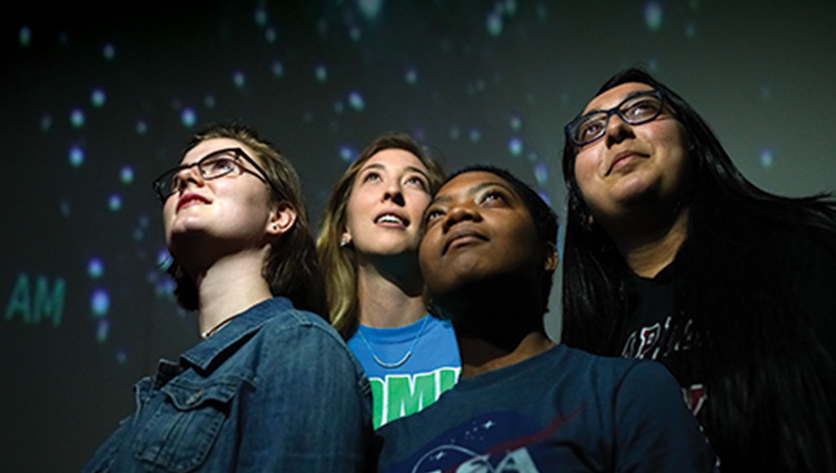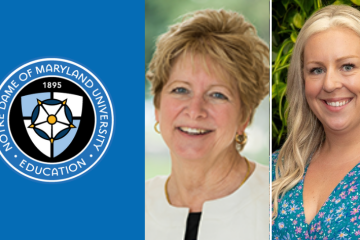STEM Degrees and Careers Are Thriving at Notre Dame

From an early age, Notre Dame of Maryland University student Sarah Hasnain ‘19 knew she wanted to dedicate her professional life to helping people live better. She also knew her interest in engineering and mathematics would play a big part in her future. Sarah, like many students past and present was able to combine her passions and discover a successful path in science, technology, engineering and math (STEM) – a path uniquely crafted in the Notre Dame Way.
“I am devoted to creating solutions to global issues through technology. I am also an aspiring American Sign Language (ASL) interpreter, and dream of a career that harmonizes my passions to create innovative, assistive devices, by applying what I have learned through studying mechanical engineering and physics,” said Hasnain.
During the summer of 2018, Hasnain and fellow student, Chevonne Bowen ’20 were overseas doing internships studying pulsar science and gravitational wave science. Bowen had the rare opportunity to use the FAST telescope (Five-hundred-meter Aperture Spherical Telescope) in China. It is the largest telescope in the world. Hasnain spent her time in Manchester, England at the Jordell Bank Centre for Astrophysics where she was part of a research team that searches for pulsars using a variety of software and data analysis methods.
The funding is an “International Research Experience for Students” NSF Grant that was awarded to members of the NANOGrav organization, of which Dr. Brian Christy, chair of the physics department, is a member.
These are valuable opportunities for any student, especially an undergraduate. Yet this is the level of quality experience that increasingly characterizes STEM programs at Notre Dame.
The majors that align with the areas of concern, where there are current and predicted shortages of qualified professionals to fulfill all of the positions needed are: physics, chemistry, technology, computer information systems, engineering (dual degree program) and mathematics.
President Marylou Yam explained, “We have an impressive track record of engaging students in scientific research, mentoring, course-embedded instructional assistants and a collaborative team approach to learning science that includes small interactive laboratory experiences.” The comprehensive approach starts in introductory science and math courses.
Dr. Debra Franklin, dean of the college of arts, sciences and business reports that these majors are robust at the University. They “represent a pretty significant segment of the women’s college population,” she said.
While educating women in the sciences is, of course, central to the mission of Notre Dame, why has it become an issue nationwide?
According to Dr. Christy, the answer is two-fold. First of all, it’s a simple numbers game. More professionals are needed in these disciplines; more than half of college students are women; if more women enter the fields, it increases the numbers overall.
But the more important reason has to do with the quality of the work in STEM fields. He said, “Science is very collaborative. It’s not something that people realize. Being able to tackle problems where people are coming at it with different viewpoints, different backgrounds, gives you a better chance of solving a problem.” In general, he said, “the more diversity you have in that group, the better that group becomes.”
Diana Sagastume is about to become a professional engineer. She graduated in May 2018 from Notre Dame and Columbia University with a dual degree in engineering. She completed a physics degree in three years at NDMU and then, through a partnership with Columbia, transferred to the New York City school for two years to complete her engineering degree.
She walked across two stages to earn two degrees.
Sagastume entered Notre Dame in 2013 knowing that she wanted to be an engineer. “Growing up, I knew I wanted to design something, like buildings,” she shared. For two summers, she interned with Whiting-Turner on the restoration and renovation of Gibbons Hall on campus. “I like being a part of the process and seeing a tangible project.”
Sagastume said she always got a lot of encouragement growing up to pursue engineering and STEM fields. She attended Baltimore Polytechnic Institute for high school.
As far as the campus environment at Notre Dame, Sagastume said she credits her three years there for helping her to be more expressive, less shy and more confident. Of her classmates, she said “we understood each other.”
Dr. Christy feels educating students in a women’s college environment is the ideal way to encourage more women to enter these fields.
“To me it seemed obvious,” he said. “Let’s go to a women’s college, where we can really radically change all of this…”
Sophomore Chavonne Bowen describes a “sisterly bond” with classmates. And, at Notre Dame, she said “Everyone supports your studies; you know everyone on campus.” Professors “encourage you to have your own voice,” Bowen noted.
In addition to the solid academic foundation, the environment in which students study at Notre Dame helps prepare them for all kinds of professional challenges.
When Sagastume continued her engineering program at Columbia, she was in class with students who had different undergraduate experiences. It reinforced for her how much she appreciated the liberal arts focus. “At Notre Dame, I was able to learn so much more.”
She described her coursework as more universal, crediting relationships with professors, “because of the smaller school, you get a better experience. Academically you get more support from your professors, you actually get to become more close with professors. So that’s what I liked about Notre Dame.”
Relationships/mentorships play a key role in the success of our students and women in science has been at the forefront of the curriculum since NDMU was founded in 1895. Read more on the University’s role and how STEM has evolved on campus.




